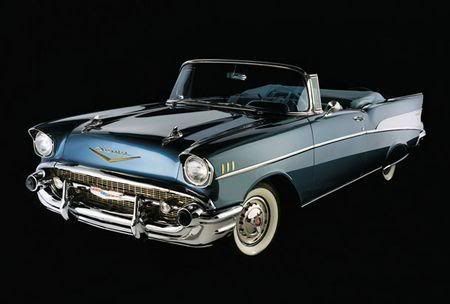
Revisionist History
My mind wandered a bit while I was driving this afternoon. I somehow started thinking about the fifties and how dark and cynical a place this world seems to be now, especially when compared to the brighter days of the 1950's.
Then, I thought, wait a minute. The 1950's were right after The Second World War and at the start of The Cold War. There is no reason that those were any brighter times than today. Then I thought that it's just people that are darker and more cynical than they were back then... nope, that can't be it either. People, by and large, haven't changed a whole hell of a lot in hundreds of years. So, what is it then? What is making me see it this way?
AH-HA! It hit me. It's the arts. Or at least the pop art. Or at least the pop art that was pop enough to survive to today. Donna Read. Sock hops. Poodle skirts. Leave It To Beaver. The Hula Hoop. Frankie and Annette. Elvis (before the "gut bombs" and sequin jumpsuits). The list goes on and on. There's this huge list of 1950's pop culture stuff that just seems so friggin' happy. And generally, even in contemporarily made pieces that are set in that era are also pretty "golly gee whiz" cheeseballs. Look at Marty McFly's parents in Back To The Future. Or the kids in SandLot.
For a second I wondered why it all tried so hard to be so idyllic. When you look at it like this, it all seems so saccharine sweet, and a little sickening. But then I remembered an article I read in a film history book, and also a conversation with my grandfather about what he says "movies are supposed to be."
To my grandpa, and the generation that lived through the depression and the years that followed, going to the movies was about escape. My grandpa looks at a movie like AMERICAN BEAUTY or BABEL and makes a face and/or uses words like "dumb." He couldn't care less about well drawn, realistic characters, or biting social commentary. He wants to see explosions like in a Die Hard film, or monsters and magic like in The Lord of The Rings trilogy. To him the Wizard of Oz is one of the greatest films of all time. Life for him, and for many people in those days, was hard enough, they wanted to watch things that made them forget all that. They didn't want a Neil Labute psycho-drama or a Todd Solondz disturb-fest back then, and they won't enjoy them now either.
To connect back to the beginning; it seems to me that art in the 1950's was sort of coasting along with that escapist idea leftover from before. Gramps' generation that had just been through a huge war and his parents who braved the depression were the ones with the movie-going dollars in the 50's, afterall. Escapists were the biggest market, so they were catered to more. So, people like me have grown up seeing that era through the rose-colored lenses of pop culture leftovers. A sort of multimedia revisionist history.
So what does our art of the late 1990's to the present day reflect about us?. I mean, if a headlong rush into escapism is a reflection of how hard life was then, what does our gritty, cynical art today reflect. Is it that things are easier for us now then they were then, so we're left to our own devices to whine and wrestle with the emotional things that people just didn't fuss much with back in the day? Or is it just a backlash as happens so often in the arts? A reactionary thrust in the opposite direction? Or is it just that we're relaxing a touch away from our puritanical roots and we're allowed to say and do things in the arts that artists in the 1950's couldn't dream of?
Or is it just that I, personally, tend to favor the thinker films over the escapist ones, and I'm completely glossing over the ever-present glut of flashy films with no substance that continue to be released summer after summer?
COMMENTS
Are you familiar with the theory which states that people generally think of the 1950s as "the good ol' days" primarily because of the large social safety net which existed in America at the time, but which has since been largely dismantled? According to this theory, people might say life was "simpler" then, or that there were "values" then which there aren't today, but people really have nostalgia for it because CEOs and celebrities didn't make obscene amounts of money compared to the rest of us and people could actually afford to buy a house and pay off the mortgage before moving somewhere else. |
|
|
|
|
|
|
|
|
|
|
|
|
|
|

No comments:
Post a Comment